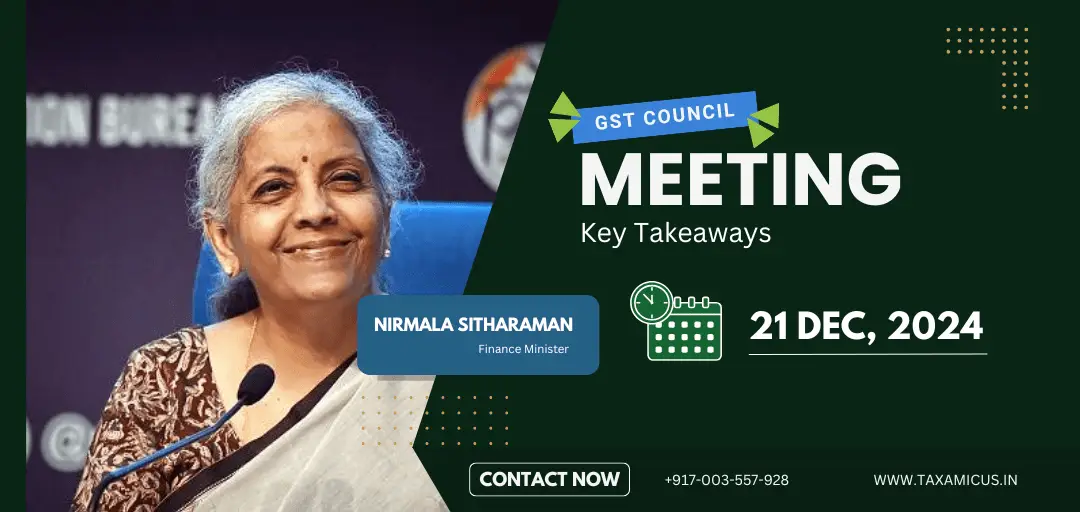GST Council Meeting Highlights
The GST (Goods and Services Tax) Council holds periodic meetings to discuss critical issues related to GST implementation, rates, compliance, and policy changes. These meetings are pivotal in shaping India’s indirect tax regime and addressing the concerns of businesses and consumers alike. Here are the key takeaways from the most recent GST Council meeting.
1. Overview of the Recent GST Council Meeting
The latest GST Council meeting, chaired by the Union Finance Minister and comprising state finance ministers, focused on streamlining tax rates, simplifying compliance mechanisms, and boosting revenue collection. The Council deliberated on several critical issues that directly impact businesses and taxpayers.
This GST Council meeting aimed to enhance ease of doing business and address ambiguities in the tax structure. Here’s a detailed breakdown of the decisions made during the meeting.
2. Key Decisions Taken
a) Tax Rate Revisions
One of the most anticipated aspects of any GST Council meeting is the revision of GST rates. In this session, the Council decided to reduce GST rates on specific essential items to make them more affordable. On the other hand, luxury items saw a slight increase in rates to maintain revenue neutrality.
For example:
GST on medical devices was reduced from 12% to 5%.
GST on uncooked, unbranded millet products was reduced from 5% to nil.
GST on molasses was reduced from 28% to 18%.
GST on high-end cars and SUVs was increased from 28% to 30%.
GST on tobacco-based products saw an increase from 18% to 20%.
b) Rationalization of Inverted Duty Structure
The inverted duty structure has been a longstanding issue. The GST Council meeting took significant steps toward resolving this problem, ensuring that input taxes don’t exceed output taxes for certain goods, thereby preventing working capital blockages for businesses.
c) Simplification of Returns
Tax compliance received a major boost in the latest GST Council meeting with the introduction of a simplified return filing mechanism. The Council decided to merge GSTR-2B and GSTR-3B forms, making compliance less burdensome for small and medium-sized enterprises (SMEs).
d) E-Commerce Compliance
The GST Council meeting addressed the compliance challenges faced by e-commerce operators. Measures to simplify the GST registration process for small e-commerce sellers were introduced. This move is expected to encourage more sellers to join digital platforms.
3. Measures to Curb Tax Evasion
Tax evasion remains a critical challenge for GST authorities. During the GST Council meeting, several measures were discussed to improve tax compliance and curb evasion:
Strengthening the e-invoicing system by lowering the threshold from Rs. 10 crore to Rs. 5 crore.
Enhancing the analytics capabilities of GSTN to identify discrepancies in filings.
Introducing stricter penalties for fraudulent transactions and fake invoicing.
4. Sector-Specific Updates
The GST Council meeting also addressed the unique needs of various sectors:
a) Real Estate
The Council proposed clarifications on the GST applicability for under-construction properties and input tax credit (ITC) utilization. These changes aim to boost transparency in the real estate sector.
b) MSMEs
Micro, Small, and Medium Enterprises (MSMEs) received special attention. The GST Council meeting recommended a higher exemption threshold for small businesses and a quarterly return filing option for enterprises with an annual turnover of up to Rs. 5 crore.
c) E-Commerce and Startups
The GST Council meeting announced measures to facilitate startups in the e-commerce domain. Simplified processes for claiming GST refunds and reduced compliance timelines were key highlights for this sector.
5. IT System Enhancements
The GST Network (GSTN), the backbone of GST implementation, will undergo major upgrades. The Council discussed implementing artificial intelligence (AI) to detect anomalies in GST returns and deploying robust systems to reduce technical glitches. The GST Council meeting reiterated the importance of a seamless IT infrastructure to support taxpayers.
6. Dispute Resolution Mechanism
A new framework for dispute resolution was proposed in this GST Council meeting. This mechanism aims to address conflicts between the Centre and states or among states. An independent body comprising tax experts and legal professionals will oversee these disputes, ensuring fair outcomes.
7. Extension of Deadlines
Understanding the challenges faced by businesses, the GST Council meeting approved extensions for various compliance deadlines:
Annual return filing dates for FY 2022-23 extended by two months.
Amnesty schemes for non-compliant taxpayers extended, allowing them to regularize their filings.
8. Revenue Mobilization
To enhance revenue collection, the GST Council meeting proposed:
Increasing enforcement in high-value transactions.
Collaborating with state governments to ensure tax compliance at the grassroots level.
Leveraging data analytics to identify non-compliance patterns.
9. State-Specific Concerns
The GST Council meeting provided a platform for states to present their concerns. States with significant revenue deficits requested an extension of the GST compensation scheme. The Council assured states that their concerns would be addressed while balancing the fiscal needs of the Centre.
10. Future Roadmap
The GST Council meeting concluded with a vision for the future:
Moving towards a single tax rate for simplicity.
Strengthening compliance mechanisms through technology.
Expanding GST coverage to include new sectors and items.
Conclusion
The GST Council meeting plays a vital role in evolving India’s indirect tax system. The latest meeting’s decisions are expected to simplify compliance, boost revenue, and address sector-specific challenges. Businesses and taxpayers should stay updated on these developments to ensure smooth compliance and take advantage of the benefits introduced.
Our GST Services

All E-commerce Tax services
E-commerce tax services help online sellers navigate GST registration, compliance, return filing, TCS management, tax planning, and audits, ensuring efficient tax management and legal compliance.

GST Filing
GST filing is the process of submitting tax returns to the government, detailing sales, purchases, and taxes paid or collected, ensuring compliance with GST laws.

GST Registration
GST registration is the process where businesses obtain a GSTIN from the government, allowing them to collect taxes, claim input tax credits, and comply with GST laws.



